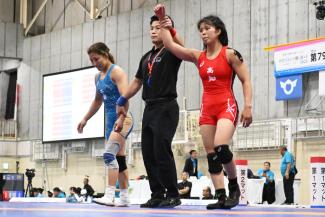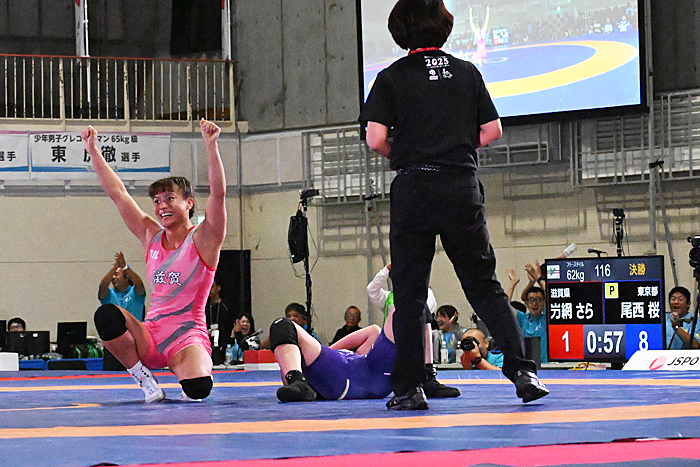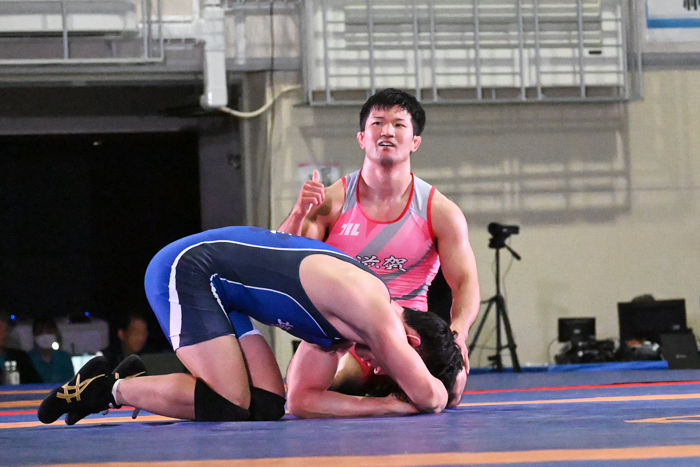Yoshida sparks rare Olympic hope for Japan heavyweights
Thursday, June 15, 2023 - 15:56 By Vinay Siwach

TOKYO (June 15) -- Arash YOSHIDA (JPN) has already etched his name in Japan's wrestling history by becoming the country's youngest male Asian champion in April. He secured the gold medal at 92kg in Astana, marking a rare triumph for Japan in the heavier weight categories, 40 years after Tamon HONDA (JPN) won at freestyle 100kg in 1983.
The 19-year-old's sensational debut on the international stage surprised everyone. On Thursday, he continued to impress by clinching the Meiji Cup title at 92kg in Tokyo, fueling his aspirations of winning a World Championship in Belgrade and becoming Japan's first Olympic medalist above 90kg later at the Paris Olympics.
"I was able to wrestle with confidence because it was a technique that I performed at an international competition," he said. "My goal this year is to win the World Championships and my ultimate goal is to win the Olympics."
To secure his spot for Belgrade, Arash must once again emerge victorious. Japan will host a playoff for the non-Olympic weight classes, where the top-two finishers of an Olympic weight class at the Emperor's Cup and Meiji Cup can compete.
Undoubtedly, he is the favorite to win the playoff on July 17. This victory will not only bring him closer to his personal goal but also fulfill his father's dream.
Javid ESFANJANI, originally from Iran, moved to Japan at the age of 23 and later married Naomi YOSHIDA. A few years later, he established Koshti Club, a wrestling club, as a way to express gratitude for the support he received in Chiba.
"Because of Japan, I was able to start my own family and build a happy home," Esfanjani told Japan Wrestling Federation in 2018. "So I thought I must do something to express my gratitude to Japan. Wrestling is something I can offer. I thought I would repay [Japan] by opening a wrestling club and developing [a new generation of] wrestlers."

Arash, who began wrestling at the age of three, is part of the group that learned the intricacies of the sport at Koshti Club, which was founded in 2012.
"I follow traditional Iranian strength training and incorporate push-ups into my routine," he stated. "Since junior high school, my father has shown me videos of international competitions."
The fourth child out of six siblings, Arash made a name for himself by becoming a five-time national champion in kindergarten and elementary school. Although he took a break during junior high school, he returned to the mat in high school and secured national titles in both freestyle and Greco-Roman wrestling. Now studying Sports Science at Nihon University, Arash is determined to achieve even greater success.
Much of his success stems from the distinct in-your-face wrestling style he learned at his father's club. This style was evident during his recent victory, as he utilized breathtaking duck-unders and seamlessly transitioned into powerful gut wrenches, a rarity in Japanese wrestling, especially in the heavier weight divisions.
In the final against Satoshi MIURA, Arash employed heavy hands to unnerve his opponent before executing a classic duck-under for the initial takedown. He maintained control with an underhook, securing another takedown and gut wrench to establish an 8-0 lead. Shortly after the break, he secured yet another takedown, ultimately winning 10-0.
Arash recorded three technical superiority victories, which were met with cheers from a group of children and friends accompanying his father. After claiming the gold medal, he expressed gratitude to his supporters.
"The support helps a lot," he said. "Even when I was trailing, I did not feel like I was losing because of the support from the stands."
Arash will need all the support if he manages to actually go to Belgrade and take on the top wrestlers in 92kg in the world. And as far as the Olympics is concerned, Arash will try to make his bid after the World Championships.
"If things go well, it would be great if I could raise my weight to 97kg this year and compete in the Emperor's Cup, and then represent at the Asian qualifiers to qualify for the Paris Olympics," he said.
What Arash is chasing is improbable in Japanese wrestling as Akira OTA is the only wrestler to win a medal at a weight class above 82kg. Ota won consecutive silver medals at the 1984 and 1988 Olympic Games at 90kg.
While that dream takes it first steps, Arash, for now, eagerly awaits July 17.


 Sara NATAMI (JPN) celebrates after beating Sakura ONISHI (JPN). (Photo: wrestling-spirits.jp)
Sara NATAMI (JPN) celebrates after beating Sakura ONISHI (JPN). (Photo: wrestling-spirits.jp) Taishi NARIKUNI (JPN) won the 74kg gold medal. (Photo: wrestling-spirits.jp)
Taishi NARIKUNI (JPN) won the 74kg gold medal. (Photo: wrestling-spirits.jp)
Share your thoughts.
Comments